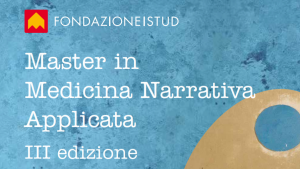 On 9th April has started the third edition of the Applied Narrative Medicine Master, a training concerning the use of Narrative in Healthcare that has, among other characteristics, multi-disciplinary, internationality and pragmatism.
On 9th April has started the third edition of the Applied Narrative Medicine Master, a training concerning the use of Narrative in Healthcare that has, among other characteristics, multi-disciplinary, internationality and pragmatism.
Multidisciplinary can be inferred from the class: different professionals – physicians, nurses, psychologists, hospital pharmacists, counselors, associations representatives, and healthcare communication experts – gathered not only for working together on Narrative Medicine tools, but also for reflecting on experiences and expectations regarding to a Narrative Health. Multidisciplinary is not a sterile fact, or a “taken-for-granted” based on the professional difference, but a conquest: participants compared their experiences, sharing different worlds that reveal their most interesting aspect in the union itself of several points of view. One of the Narrative Medicine Master purpose is specifically that of create “bridges” connecting these everyday experiences and reflections.
Guest in this first meeting was Vera Kalitzkus, medical anthropologist from Düsseldorf University who, among the several experiences in the Narrative Medicine field, has brought narrative in General Practice. During the discussion, Kalitzkus reported a very interesting element: as Langewitz and colleagues pointed out, two minutes of non-interruption are sufficient for the patient to feel more included in the relationships with the general practitioner – two free-flow minutes without interruption, after that the patient, in the most of cases, silences: then, not interrupting him or her can facilitate the diagnostic process by doctor, and it is evident that the “short time” alibi does not subsist.
In these first three days, preliminary contents and tools of Medical Humanities, reflective writing, empathy, coping, narrative, care relationships and mindfulness has been approached: a first entrance in Narrative Medicine that will bring professionals to individuate concrete interventions to be applied in their everyday practice, aiming an improvement of services for all.
In particular, the reflective writing practice contributed to an higher self-consciousness – above all, in the moment of the encounter and confront with the other. Through narrative, can emerge the capability to distinguish, in term of health management, if relationships weighing on working and emotional stress derive from organizational or personal problems, or both: narrative pragmatism consist in the identifying of bonds, sometimes unexpressed or not solved, that weigh in the working and personal environment on the professionals involved in the health and healthcare field.
Before the next appointment on 18th June (second module), professionals will work on the preparation of project works that, with the support of an expert tutorship, will allow them experimenting Narrative Medicine in their own fields.
